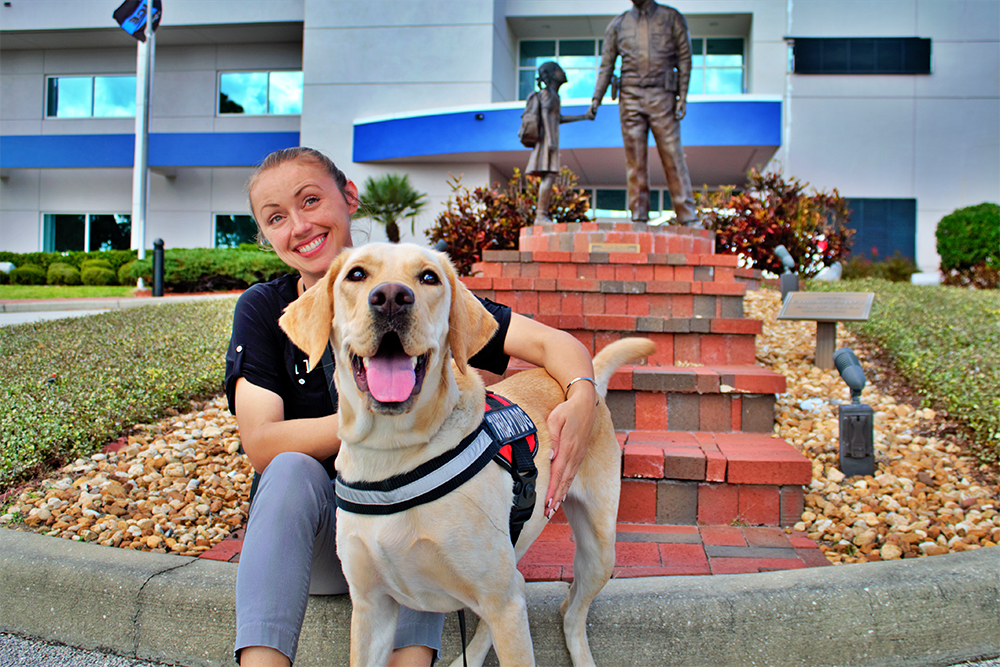Winter Haven Police Department Therapy Dog Winning Hearts
by PAUL CATALA
The Winter Haven Police Department wants everyone to know their Miranda rights. In this particular case, those rights include the right to feel better, release anxiety, run fingers through soft fur and maybe even throw a ball.
Miranda is one of the newest members of the Winter Haven Police Department to walk on four legs. She’s an almost 2-year-old yellow Labrador retriever who has been “hired” into the approximately 90-member police force as its first therapy dog.
Whatever the situation, Miranda is ready to assist. With a gentle nudge, a chance for a petting or just a sympathetic stare of compassion that doesn’t discriminate, she’s there to calm and quell.
Across the United States, law enforcement agencies have been using therapy dogs on their forces not only to apprehend criminals, find missing people or sniff and seek out drugs or explosives, but also to calm tense situations, alleviate anxiety, provide compassion to crime victims and help the department connect with the community.
Miranda is the first therapy dog employed by a law enforcement agency in Polk County, said her handler WHPD Detective Elyse Chapnick. Miranda joins five K-9 patrol dogs already on the force and was donated to the police department by Kathy Leggett, owner of Mediation and Counseling Consultants in Winter Haven. Miranda has been trained and certified as a therapy dog.
During a workday at the police department, Chapnick and Miranda head out to the parking lot for some playtime. As Miranda plays with a fluorescent-green ball toy, Chapnick instructs her to sit while she pulls the toy from the dog’s mouth.
“These (therapy) dogs have to be friendly and calm; they can’t at all be aggressive,” says Chapnick, who’s been with the WHPD for four years. “It’s a disposition they’re born with, and we picked that up pretty quickly with her.”
Since starting in July 2019, Miranda has been out in the community with the police force on a regular basis. Chapnick says that studies on therapy dogs show they’ve helped put officers at ease after traumatic experiences on the job. The American Kennel Club says visits by therapy dogs can lower blood pressure and heart rate, reduce patient anxiety and increase levels of endorphins and oxytocin.
Joining Chapnick during Miranda’s playtime is WHPD Chief Charles Bird.
Besides offering on-scene stress reduction, Bird says the work of therapy dogs such as Miranda helps curb officer suicide rates due to on-the-job stress. According to preliminary data compiled by Blue H.E.L.P., a law enforcement mental health advocacy group, at least 167 officers died by suicide in 2018 — more than line-of-duty deaths resulting from other causes such as felonious assault, patrol vehicle accident, heart attack and duty-related illness.
“Officer suicide rates are climbing. I saw there’s a station dog at the Winter Haven Fire Department, and I saw the way he interacted with firefighters,” says Bird, who is in his 30th year with the WHPD. “That got me interested in looking for therapy dogs for our officers.”
Miranda lives with Chapnick and her two sons. Chapnick says the dog took part in 2018 Paws and Stripes animal-assisted therapy classes at a correctional facility in Titusville. The canine then went through basic obedience classes to learn to sit, stay, get comfortable around wheelchairs and learn to be gentle around toddlers and the elderly.
Finally, Miranda was certified by the Alliance of Therapy Dogs in April after being tested in a nursing home, a hospital and a Home Depot.
“She learned to instinctively notice when people are crying or upset. She’ll go nudge them for a pet to try to avert their attention,” Chapnick explains.
An average day for Miranda — named after the Miranda rights read to criminal suspects during their arrests — generally consists of having free rein of the police department from 7 a.m. to 5 p.m. until a call for her comes in. At a scene or during a stressful situation, crime victims — especially those of violent crimes — find Miranda to be a calming diversion, something Bird says is helpful for victims when they have to talk about traumatic experiences during victim interviews.
“They can have a little bit of calm and comfort, and that will help them through the process and help build a better case, because they’ll be more comfortable talking to us and provide better information,” he adds.
Bird says the department’s therapy dog program could grow in the future if there’s a need, and the department is open to adding more therapy dogs if necessary.
“We really encourage other public safety departments to look into this because there are a lot of benefits to this, and we see it every day,” says Bird. “She’s great at making someone refocus and take a burden off them during a traumatic situation.”
